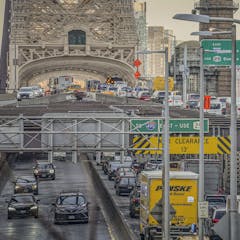
Articles sur Cities
Affichage de 1 à 20 de 1510 articles

Love it or hate it, the ‘Acela Corridor’ has developed a widely recognized identity thanks to the trains that link it together.

African cities with over 10 million residents are getting hotter fast. Millions face disaster in these urban heat islands unless the cities start greening and adapting to climate change soon.

Before we draw conclusions about the implications of social isolation, we should check our expectations of how, when and why neighbouring does or does not happen.

Legal precedents hold that criminalizing someone for their status, such as being homeless, is cruel and unusual punishment. But what if that status leads to actions like sleeping in public spaces?

Urban policy needs to look beyond housing development and address the land ownership patterns that underpin our cities.

One more reason not to drive into midtown Manhattan: Soon it will cost an extra $15 as New York City launches its long-debated congestion pricing system.

A new study shows how front yards can serve as windows into the inner lives of their residents – and their feelings about their home, neighborhood and city.

Maxim Samson speaks to The Conversation Weekly podcast about the hidden lines that explain variations in everything from access to education to animal species

The US economy relies on immigrants to fill jobs, but many of them are struggling with high rent burdens that make it harder to build productive lives and integrate into their communities.

Female mosquitoes don’t want to lay their eggs alone, but they don’t want sites that are too crowded either. Understanding what guides their choice could inform new control strategies.

Mapping where water once flowed is important for managing flood risk today in Detroit and elsewhere.

A new report on sustainable and affordable housing falls short by failing to fully consider land-and-housing market dynamics.

Feelings of “time scarcity” are on the rise, but research shows that natural surroundings can help us to slow down.

Subnational authorities are leading the charge on a just transition and dealing with climate change impacts. It is time for this key role to be reflected in international climate negotiations.

Citizens in South Africa’s industrial heartland use too much water, the city wastes way too much and there is too much theft of drinking water.

Many incentive programs promote e-bike use, but they aren’t necessarily targeting the right people for the right reasons.

One of the earliest known references to asbestos may come from Theophrastus, a student of Aristotle and his successor at the Lyceum in Athens.

‘Situationists’ believe the physical spaces around us, and how we interact with them, has a significant impact on how we feel.

Canada’s cities must be planned around resident
health and well-being, our research reveals the key barriers to developing truly healthy cities.

The inability of city authorities to enforce land-use regulations has allowed people to carry out ecologically unfriendly activities along the water bodies.
